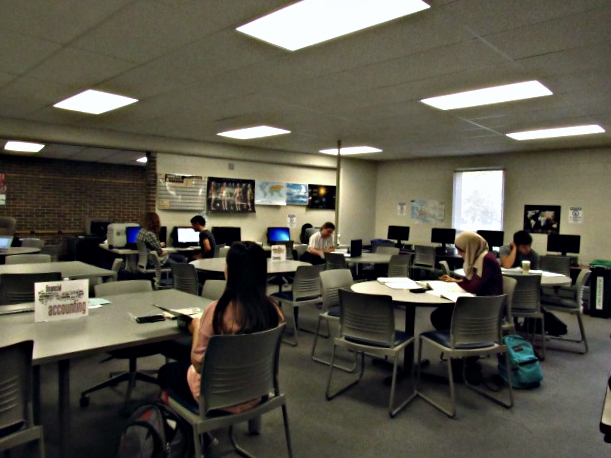Student Resources: SI and Learning Lab
By: Lane Hardy
One of the many resources available to Illinois Central College students is Supplemental Instruction, which offers group study sessions for difficult classes led by both students and professionals called workers, the SI leaders. Unfortunately many students seem to be unaware of its existence or don’t believe it can actually help them.
“The big difference between SI and tutoring is that we target classes; there’s nothing remedial about it,” said Rachel Stanford, coordinator of the program.The program covers specific biology, chemistry, sociology, computer science, and math classes and is open to anyone.
The SI leaders are ICC employees who have successfully completed the course in the past, with a grade of at least a B. Their job is to mirror the actions of the student: attending lectures, taking notes, completing assignments, and even taking tests. This enables them to be uniquely qualified for identifying exactly what students need to learn and how they should learn it.
Stanford, who had previously tutored at Heartland Community College, exudes excitement when discussing the program.
“The big difference between SI and tutoring is that we target classes. There’s nothing remedial about it,” Stanford said.
The classes which the program cover are chosen based on failure rates; so they exist where they are needed most based on the content, rather than the students.
“I think it’s very nice for students to have options where there’s kind of a peer environment and group lead facilitation,” she said. “It’s really that kind of group atmosphere which gets ideas generated that wouldn’t necessarily be generated in a one-on-one situation.”
Because the program is multifaceted, students are exposed to elements beyond the content of the course such as study skills, interactive activities, and creative exploration of the subject.
John Jenkel, the senior SI leader added, “It also teaches self sustenance. We guide the students, we’re not doing the work for them. They learn how to do these kinds of things through modeling, through actually doing role-playing, where the role is being a student.”
Jenkel who has been involved with the program since 2014 said, “Our focus in the group studies are less on getting the grade, and more on getting the knowledge.”
He added, “the idea is to engage the brain and to engage it enough in the ways that learning tends to work.”
And it does work, according to Stanford: “Our metrics show that students who regularly attend increase their GPA for that class by half of a letter grade.”
The SI program does not have a fixed physical location. It takes place in various classes where there is a need. It operates in relaxed atmosphere, food and drink are allowed and students are free to come and go as needed; all that is expected is that they listen and participate.
SI is just one tool ICC offers to students. For those who require a more abstract environment, where both group and individual tutoring can occur, there are learning labs.
Like SI, the learning lab focuses on courses which have historically been difficult. It is run by students who have made it through them successfully. The difference is that in the Learning Lab there is no lesson plan, students can come with any question or subject with which they require assistance.
Ethan Hedman , coordinator of the Learning Lab is passionate about education and helping students achieve success.
“Fundamentally, I think education is something that has a positive impact on people’s lives,” Hedman said. “Because I know that it has in mine.”
While one on one tutoring is readily available, it’s common for impromptu group study sessions to form. Ethan explained that students frequently recognize others from their classes, and naturally come to pool their resources, learning from and checking their understanding with the others.
“I do think that learning is a communal process, “ Hedman said.
The positive role that it can play in students’ education is something that he takes very seriously. He believes that learning to work collaboratively is a hugely important aspect of education which is reflective of how society works.
The main goal of the Learning Lab, Hedman said is to encourage independent learning. Students who visit the lab can expect to be taught about things like effective note taking and how to prepare for a test.
“Good study habits are transferable,” he said, suggesting that what has been successfully applied in one course can sometimes be applied to others.
The learning lab staff are vigilant about directing students to the appropriate resource because, teamwork among services is vital, he said.
“More than anything else I would just strongly encourage students to get to know each one of these services more,” Hedman said.
For more information check out these web pages.
icc.edu/si (Supplemental Instruction)
icc.edu/learninglabs (Learning Labs)
Cover photo credit: Kylee Jennings

